Pre-employment screening is all about finding the right people for your company. It helps you see the skills and qualities that a potential hire will bring to your team.
This blog post exists to help you compare Adaface and Symphony Talent. By the end, you'll know which platform suits your recruitment needs best.
Table of contents
How does Adaface work?
Adaface is an AI-powered assessment platform designed to help recruiters screen and shortlist candidates efficiently. It offers a wide range of assessments, from coding tests to aptitude and psychometric evaluations.
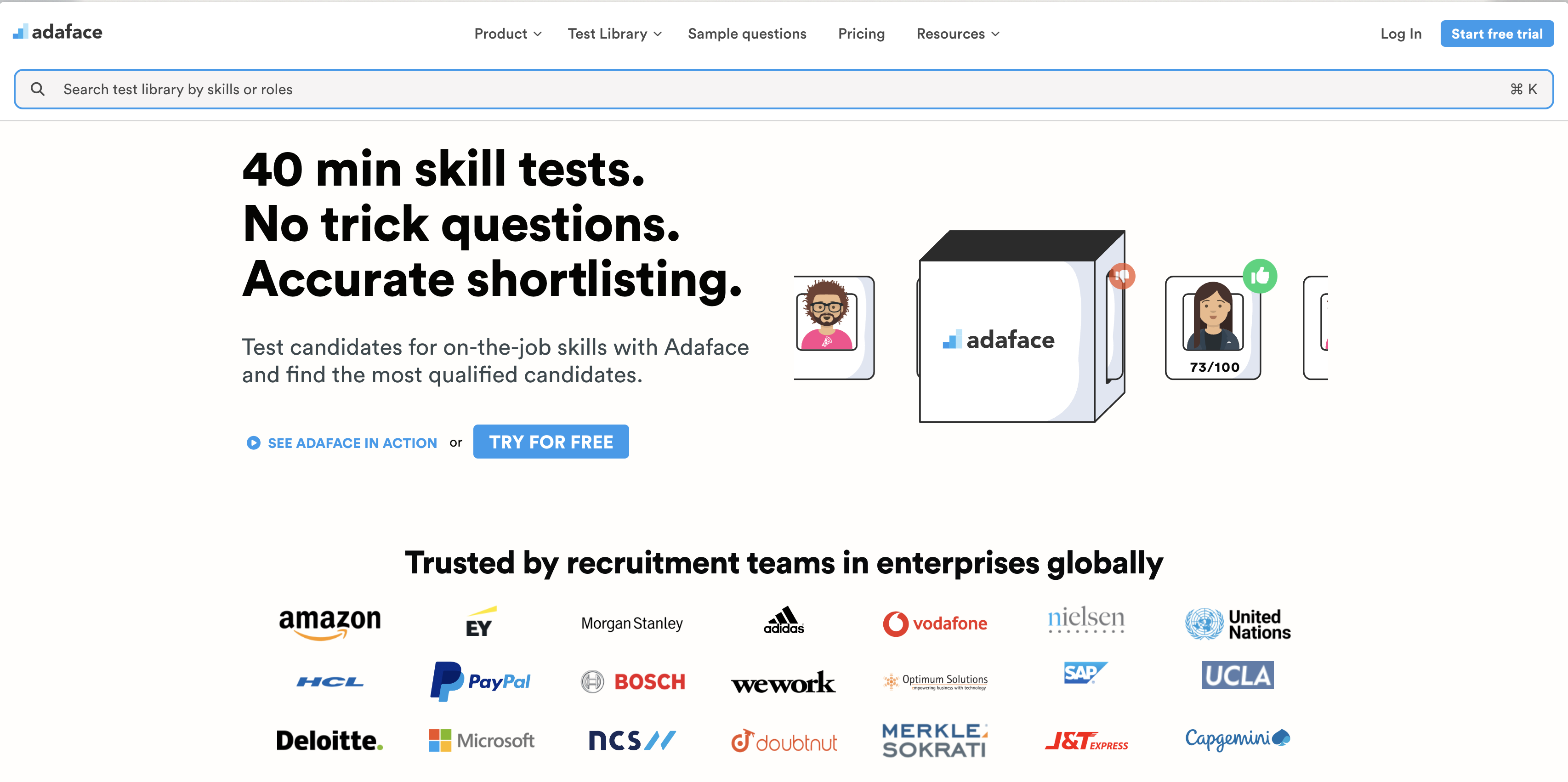
Recruiters use Adaface to create customized assessments that match specific job descriptions. By tailoring questions to the role, Adaface ensures a more accurate evaluation of candidates' skills, making the hiring process smoother.
In addition to tailored assessments, Adaface provides robust proctoring features, which allow recruiters to maintain the integrity of the tests. The platform tracks browser activity, location, and even uses webcam monitoring to ensure fairness.
One standout feature of Adaface is its conversational interface, designed to enhance candidate experience. Unlike traditional tests, this format makes candidates feel more engaged, leading to better completion rates.
How does Symphony Talent work?
Symphony Talent is a talent acquisition platform that offers tools for attracting, nurturing, and hiring candidates. It provides modern, AI-driven solutions to streamline recruitment processes, focusing on creating a strong candidate experience.
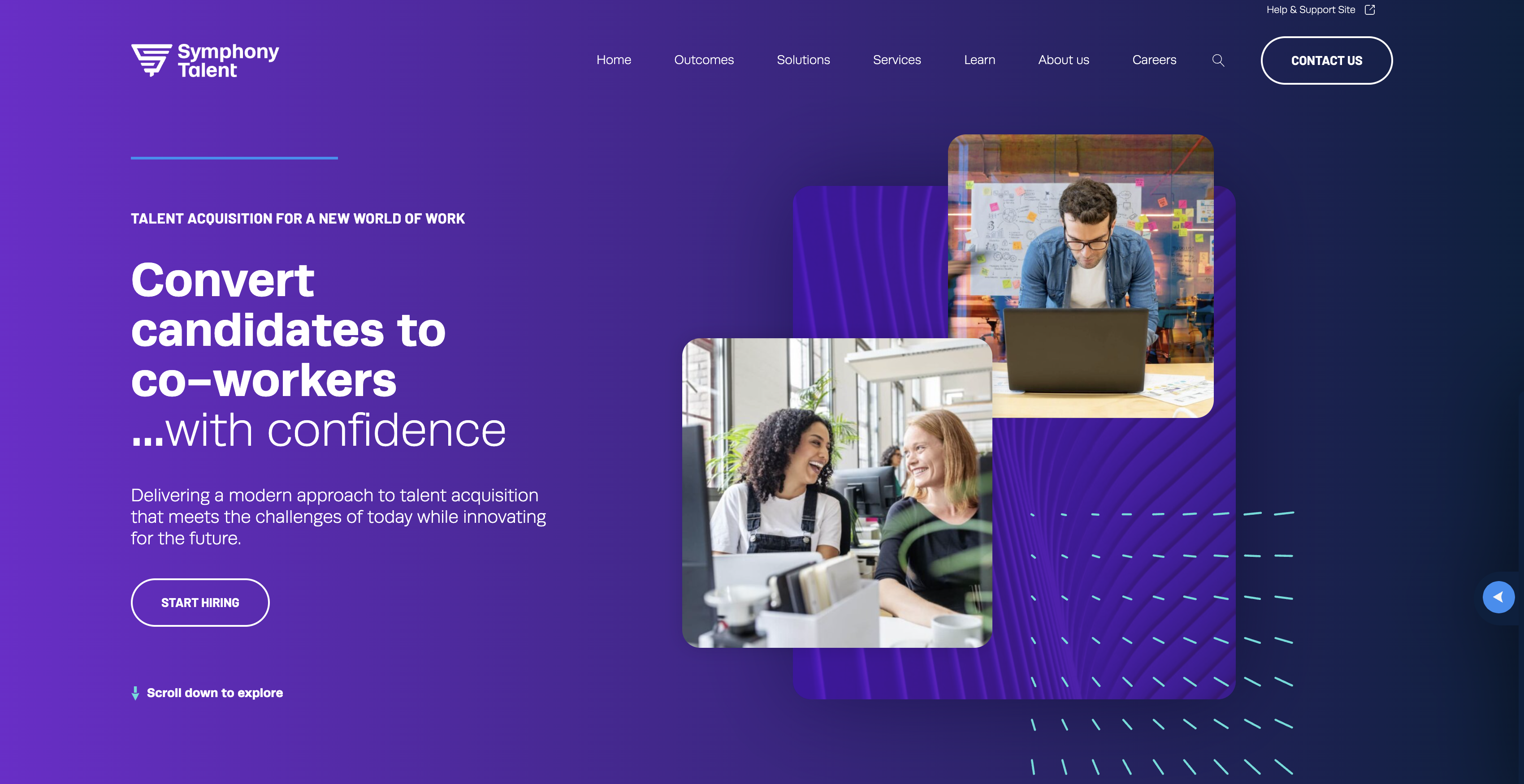
Users can create job-specific assessments and customize them to match various roles. Symphony Talent supports aptitude, business, typing, and personality tests, but lacks programming, situational judgment, and finance tests.
For companies aiming to provide consistent branding during recruitment, Symphony Talent allows adding custom questions and own questions to assessments. However, it does not support customized tests based on job descriptions or multi-language assessments.
One downside is that Symphony Talent’s assessments are not mobile-friendly and lack some advanced proctoring features such as Chat GPT protection, device fingerprinting, and extensive question banks for varied, cheat-proof evaluations.
Adaface vs Symphony Talent: Test libraries
Adaface boasts a diverse and extensive test library catering to 500+ skills, including programming, business, and cognitive ability tests. Symphony Talent offers tests in various domains but lacks the breadth and variety that Adaface provides, especially in technical and language assessments.
Using these test libraries helps recruiters streamline the hiring process, ensures candidates possess the necessary skills, and reduces hiring biases. By leveraging a range of test types, companies can make more informed decisions, leading to better role-function fit and employee retention.
Adaface's test library
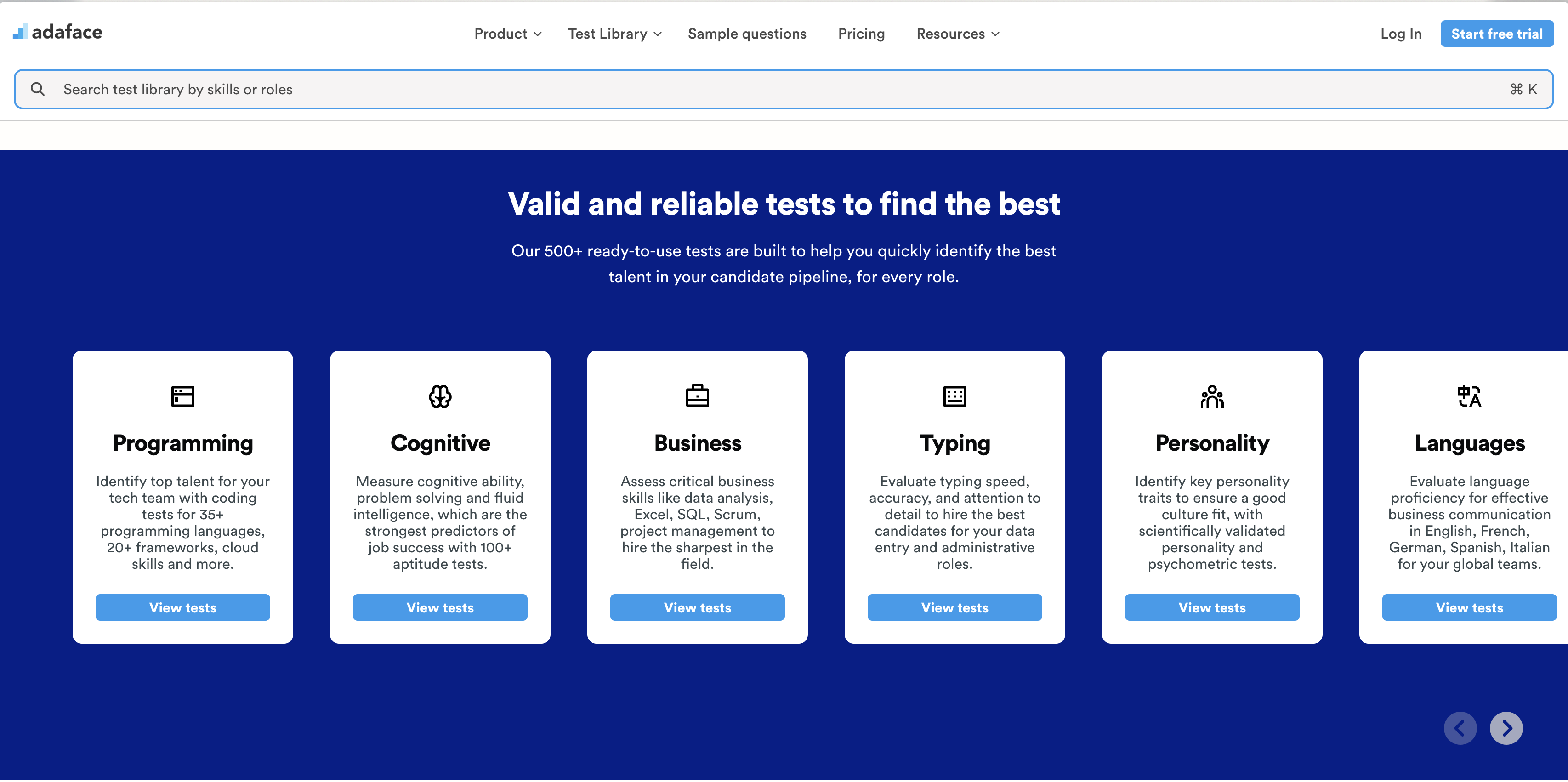
Adaface's test library is a treasure trove for recruiters seeking specific skills assessments. Here's what you get with Adaface:
- A catalog of over 500+ pre-employment assessment tests across numerous domains
- Tailored role-specific tests and an assortment of personality tests to gauge cultural fit
- Advanced technical assessments for roles in artificial intelligence, cloud computing, and more
Recruiters utilize Adaface's extensive library to create comprehensive and customized evaluations that fit their exact job descriptions. This customization ensures that candidates are tested on relevant skills, providing a better match for the role.
In action, simply select from the ready-to-use tests, customized options or even add your own questions. Adaface's platform allows for seamless integration, offering a user-friendly interface to manage and deploy assessments, making the recruitment process smoother and more aligned with the desired skills.
Symphony Talent's test library
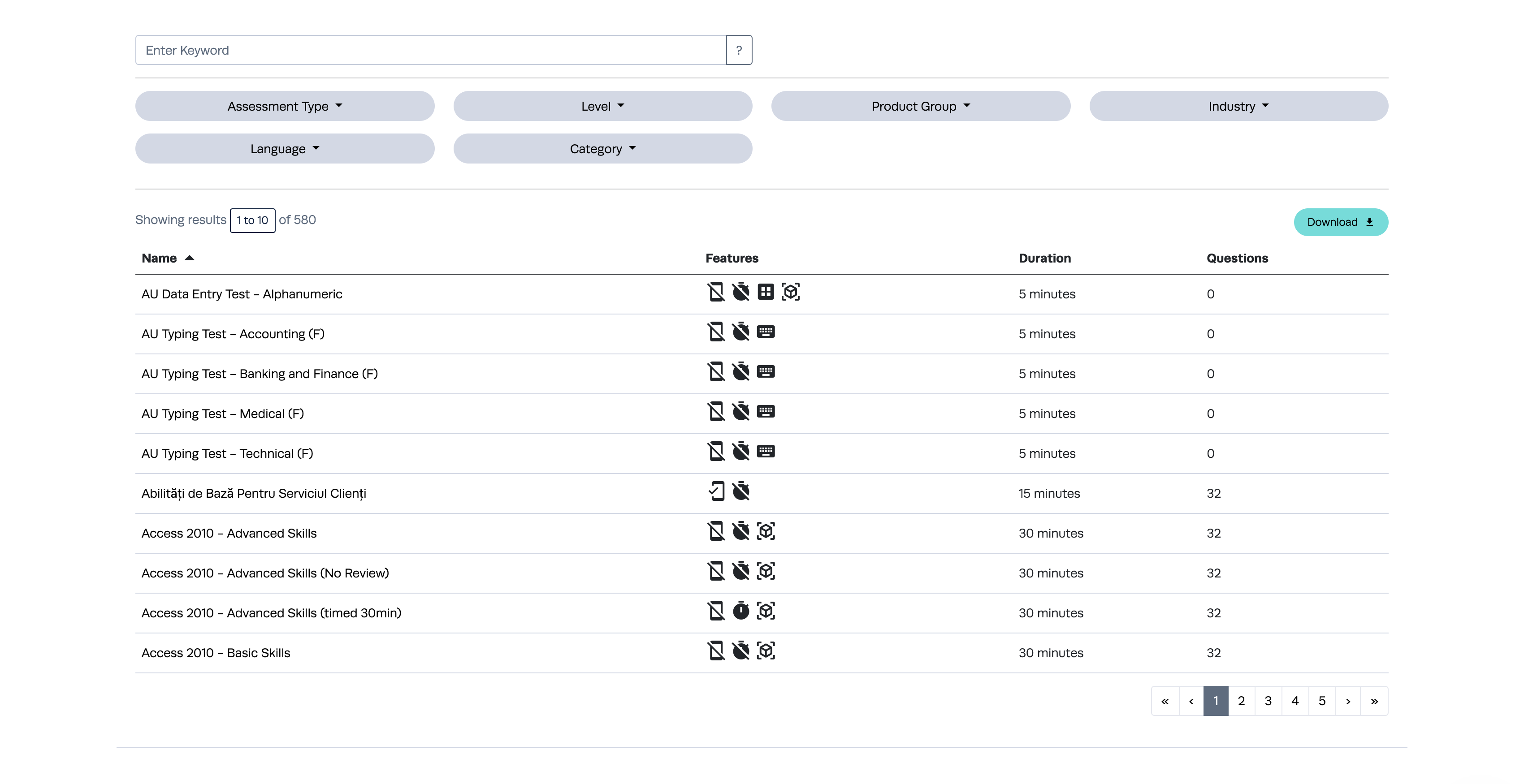
Symphony Talent's test library includes aptitude, business, typing, and personality tests. They also offer job-specific tests and the ability to create custom questions.
For companies looking to assess candidates' personality and business skills, Symphony Talent provides useful tools. They allow employers to add their own questions, making it easier to tailor assessments.
However, Symphony Talent's library lacks programming, situational judgment, language, finance, and AI tests. It also doesn't offer customized tests based on job descriptions.
Comparison of test libraries
Adaface vs Symphony Talent: Developer hiring
When hiring developers, it's important to gauge a candidate's technical skills, ensuring they align with team needs and project demands.
Adaface offers a range of functionalities including coding challenges, MCQs, and automated scoring, while Symphony Talent lacks coding questions and coding playback features.
Hiring developers with Adaface
Adaface's functionalities for hiring developers test library
- Coding language questions (Java, Python, etc.)
- Web framework questions (React, Angular, etc.)
- Mobile framework questions (Flutter, React Native, etc.)
Recruiters use Adaface to quickly and accurately assess technical competency across various frameworks and languages, tailored to specific job requirements.
Additionally, features like code playback and custom coding questions make Adaface highly versatile, enhancing the recruitment process for developers.
Hiring developers with Symphony Talent
Symphony Talent offers a range of programming assessments, but their approach is quite limited. While they provide coding challenges, they lack comprehensive support for diverse programming languages and frameworks, such as web and mobile development. This could leave employers wanting more when it comes to evaluating a developer's full skill set.
Their test library includes a selection of coding challenges that can help filter candidates based on specific technical skills. However, without the inclusion of web framework or data structure questions, it may not cater effectively to the nuanced requirements of modern development roles, which typically demand a broader knowledge base.
Moreover, Symphony Talent doesn't offer features like coding playback or automated scoring, which can streamline the evaluation process and provide deeper insights into a candidate's coding style. This absence could lead to a more cumbersome assessment experience for hiring managers trying to gauge candidates effectively.
Comparison of developer hiring features
Adaface vs Symphony Talent: Candidate experience and company branding
Candidate experience and company branding can make or break your recruitment strategy. A seamless and engaging experience ensures that candidates form a positive impression of your company, which is vital in a competitive job market.
When evaluating assessment platforms, features like mobile-friendly tests, qualifying questions, and customization options play significant roles. These elements not only enhance the candidate's journey but also uphold your company's brand standards throughout the process.
Candidate experience and company branding with Adaface
Adaface shines in providing a great candidate experience with its conversational interface. Unlike traditional tests, Adaface uses a chat-based format that feels more like a conversation, putting candidates at ease and often leading to higher completion rates.
Mobile-friendliness is another standout feature of Adaface. Candidates can take assessments on their preferred devices, making the process more accessible and convenient. While serious coding challenges are still best tackled on a desktop, most tests can be easily completed on mobile.
Customization is key for strong company branding, and Adaface offers a range of options. Companies can add their logo, brand colors, and even customize invitation and rejection emails. This not only enhances the candidate experience but also keeps your brand consistent and professional throughout the hiring process. Learn more about our features.
Candidate experience and company branding with Symphony Talent
Symphony Talent’s candidate experience falls a bit short in a few areas. While they offer email support and comprehensive help documentation, their platform lacks a conversational interface and mobile-friendly assessments. The typical assessment length is around 30 minutes, which is reasonable but not optimized for all candidates.
When it comes to company branding, Symphony Talent seems to miss the mark. They do not provide options to include company logos, brand colors, or customizable invitation templates in their assessments. This could limit how well companies can represent their brand during the hiring process.
Imagine a scenario where candidates receive beautifully branded invitations and can take mobile-friendly assessments that mirror a company's culture. This is where Symphony Talent could improve. A more engaging, branded, and flexible assessment experience could elevate both candidate satisfaction and company image.
Adaface vs Symphony Talent: Anti-cheating features
When evaluating assessment providers like Adaface and Symphony Talent, effective anti-cheating features are non-negotiable. Recruiters want to ensure that assessments reflect true candidate capabilities and aren’t skewed by dishonest tactics.
Anti-cheating features of Adaface
Adaface takes proctoring seriously, offering a suite of features designed to maintain test integrity. Key features include:
- User Authentication: Ensures the right person is taking the test with email authentication.
- Webcam Proctoring: Monitors candidates via webcam, confirming their presence throughout the test.
- IP and Location Logging: Tracks candidates’ IP addresses and locations to spot potential cheating.
- Device Fingerprint Proctoring: Helps identify whether multiple candidates are using the same device.
In addition to these, Adaface offers copy-paste protection, which prevents candidates from sharing answers, and social listening for task leaks to stay ahead of question exposure. Plus, the large 20K question bank ensures diversity in assessments, making it harder for questions to be leaked and shared.
With features like ChatGPT protection that flags when candidates switch to AI tools, Adaface takes proctoring to the next level. These measures not only protect the integrity of tests but also help recruiters make informed hiring decisions. For those looking to learn more about online proctoring, check out Everything you should know about online proctoring.
Anti-cheating features of Symphony Talent
Symphony Talent offers some basic proctoring features to ensure the integrity of their assessments. They have user authentication to verify the test taker's identity.
User authentication is useful for making sure the right person is taking the test, which is helpful for maintaining the test's credibility.
However, Symphony Talent lacks more advanced anti-cheating features like device fingerprinting, location logging, web, and webcam proctoring. These missing features could make it easier for candidates to find ways around the system.
Comparison of anti-cheating features
Adaface vs Symphony Talent: Pricing and free trial
Pricing for assessment tools can swing between affordable and premium, depending on the features and scale of use. Recruiters should look for transparent and flexible pricing plans that align with their hiring needs.
Adaface pricing
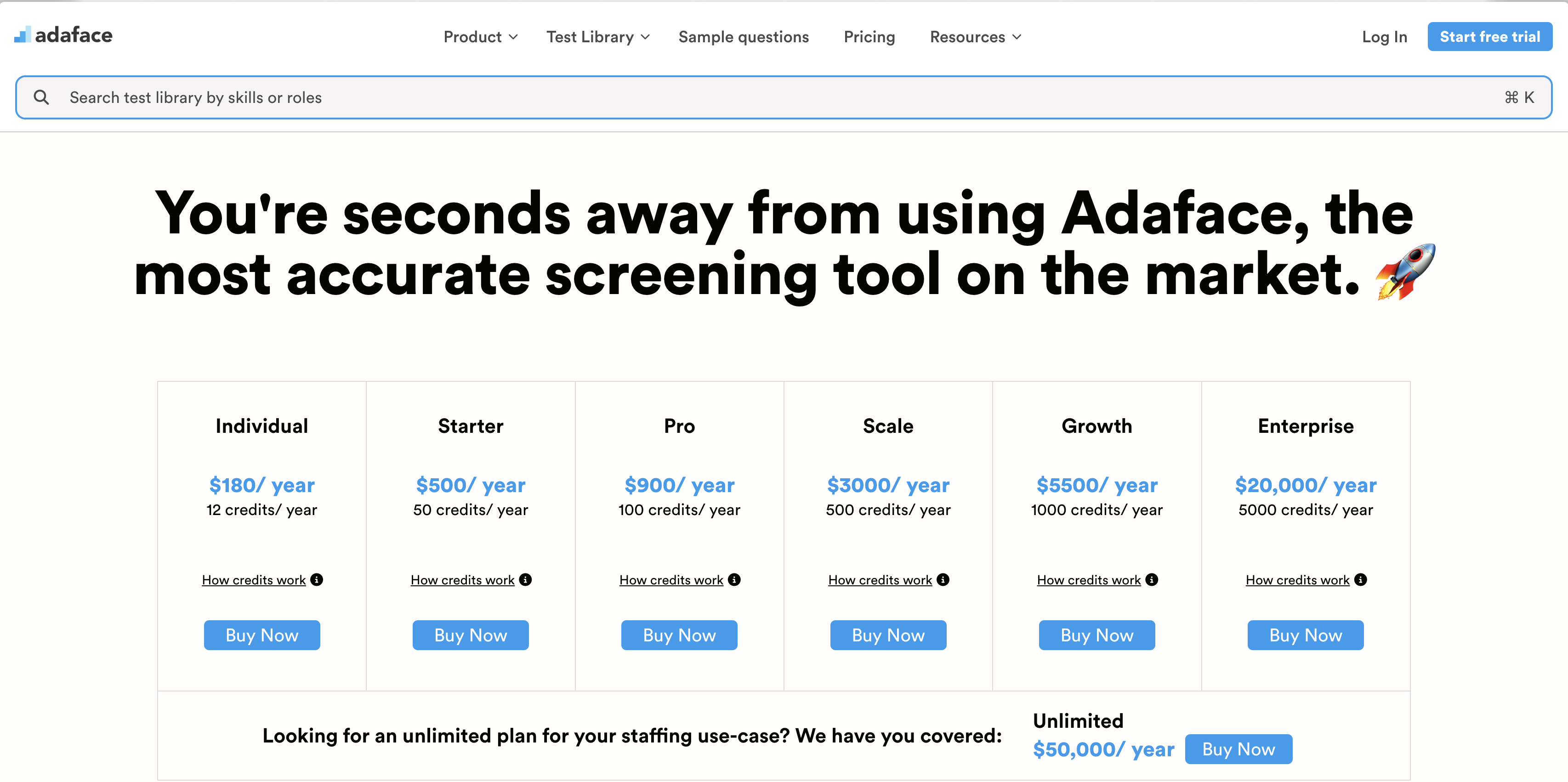
Adaface offers a range of pricing plans designed to cater to businesses of all sizes. Our plans are structured to provide maximum value and flexibility. Here's a quick overview:
- Starter Plan at $500 for 50 credits.
- Scale Plan at $3000 for 500 credits.
- Growth Plan at $5500 for 1000 credits.
- Enterprise Plan at $20000 for 400 credits.
- Unlimited Plan at $50000 per year for unlimited assessments.
Our pricing is designed to be straightforward and easy to understand. You can sign up and explore all features of the platform before making a purchase decision. We also offer a free trial to help you evaluate our offerings.
For companies, this means no hidden costs and the flexibility to scale assessments as your hiring needs grow. Whether you're a startup or an enterprise, our plans ensure you only pay for what you need.
Symphony Talent pricing
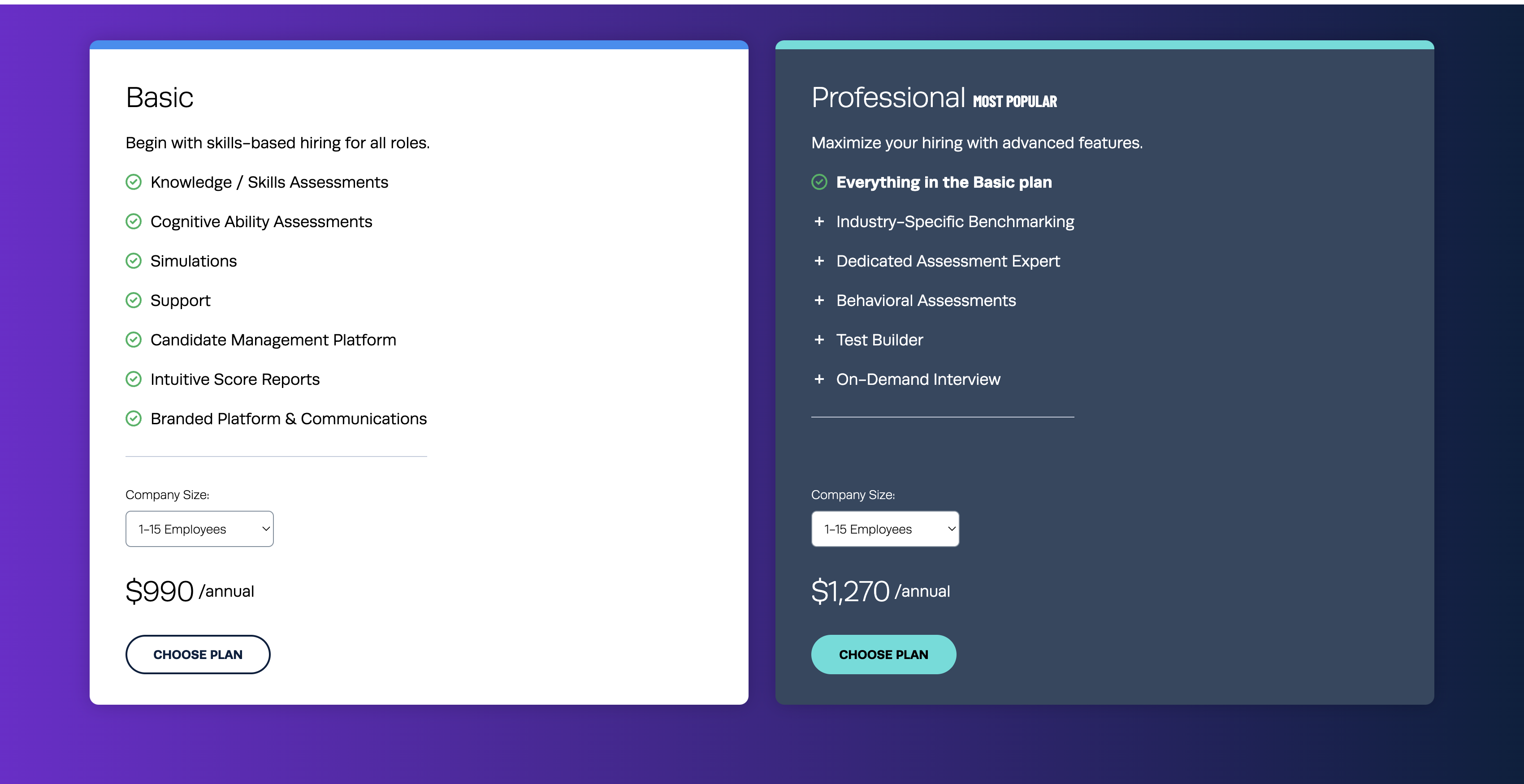
Symphony Talent offers a tiered pricing structure based on company size, which can be a bit like trying to find a unicorn in a haystack. Their plans include:
- Starter Plan: $990 per year for 1-15 employees.
- Scale Plan: $4,090 per year for 31-50 employees.
- Growth Plan: $13,200 per year for 101-200 employees.
- Enterprise Plans: Starting price for 200+ employees, but specific details are a bit elusive.
While these plans cater to different business scales, the exact pricing may not be as clear-cut for potential users.
However, Symphony Talent's pricing lacks a few things that could make life easier for recruiters. For instance, there’s no free trial option, meaning you can't play around with the features before making a commitment. Plus, signing up isn't as straightforward as it could be; potential users have to jump through hoops before they can explore the platform. It's like wanting to go on a roller coaster but having to wait in a long line just to buy a ticket!
Comparison of pricing
Adaface vs Symphony Talent: Scorecards, reporting and analytics
For hiring teams, scorecards, reporting, and analytics are vital to assess candidates effectively. These features help recruiters analyze candidates' performance, identify strengths and weaknesses, and make informed hiring decisions.
Adaface scorecards, reporting and analytics
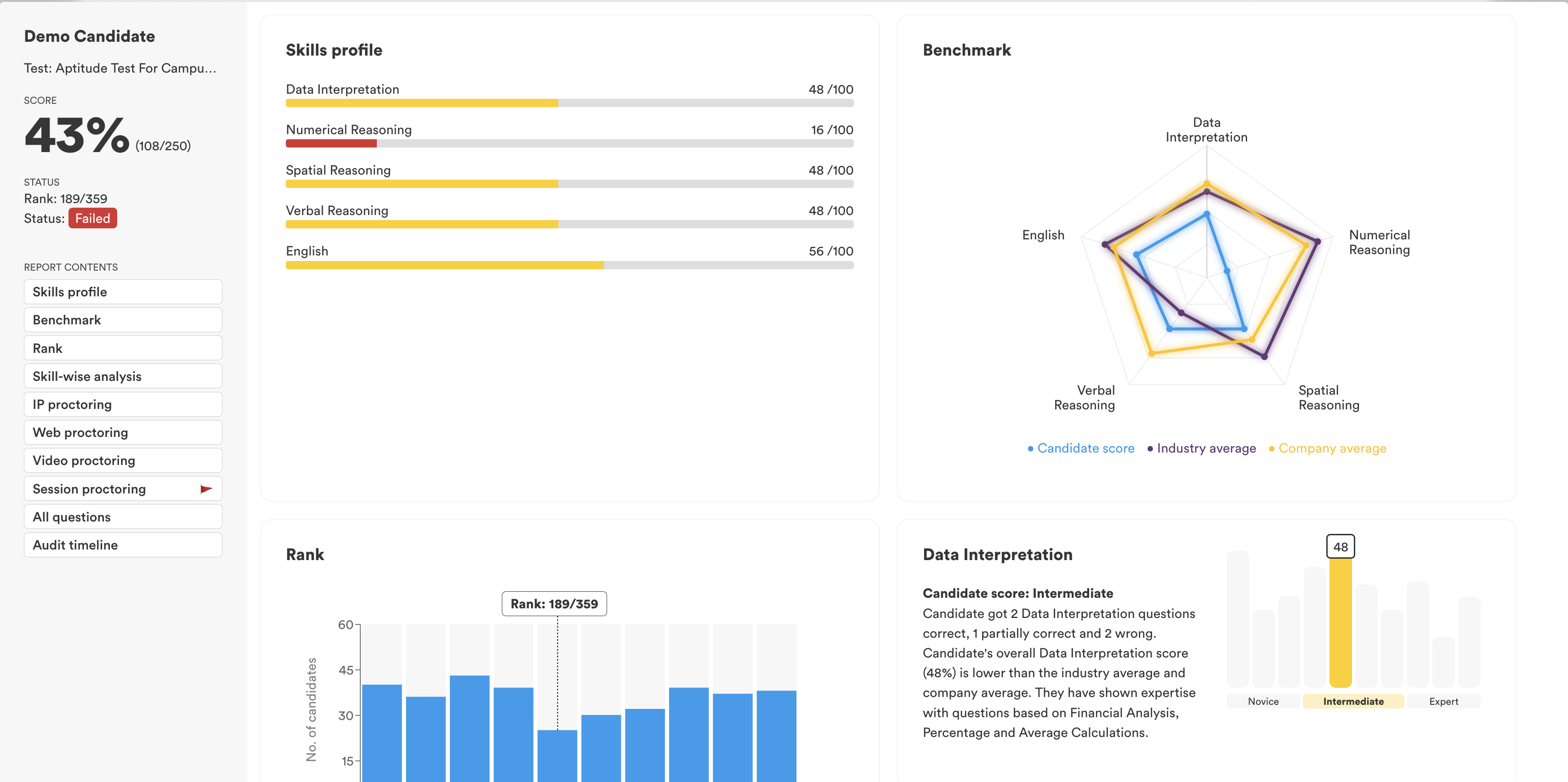
Adaface offers comprehensive reporting and analytics capabilities. It provides scorecards in PDF, Excel, and CSV formats, enabling easy sharing with team members. Recruiters can benchmark candidates against industry standards and access skill-wise analysis to understand areas of strength and improvement.
Additionally, Adaface provides a detailed audit timeline, giving recruiters visibility into proctoring logs for thorough candidate evaluation. The platform generates scorecards automatically and sends alerts, streamlining the hiring process. With its comprehensive overview, recruiters can compare multiple candidates' scores across various skills, facilitating data-driven decision-making.
Symphony Talent scorecards, reporting and analytics
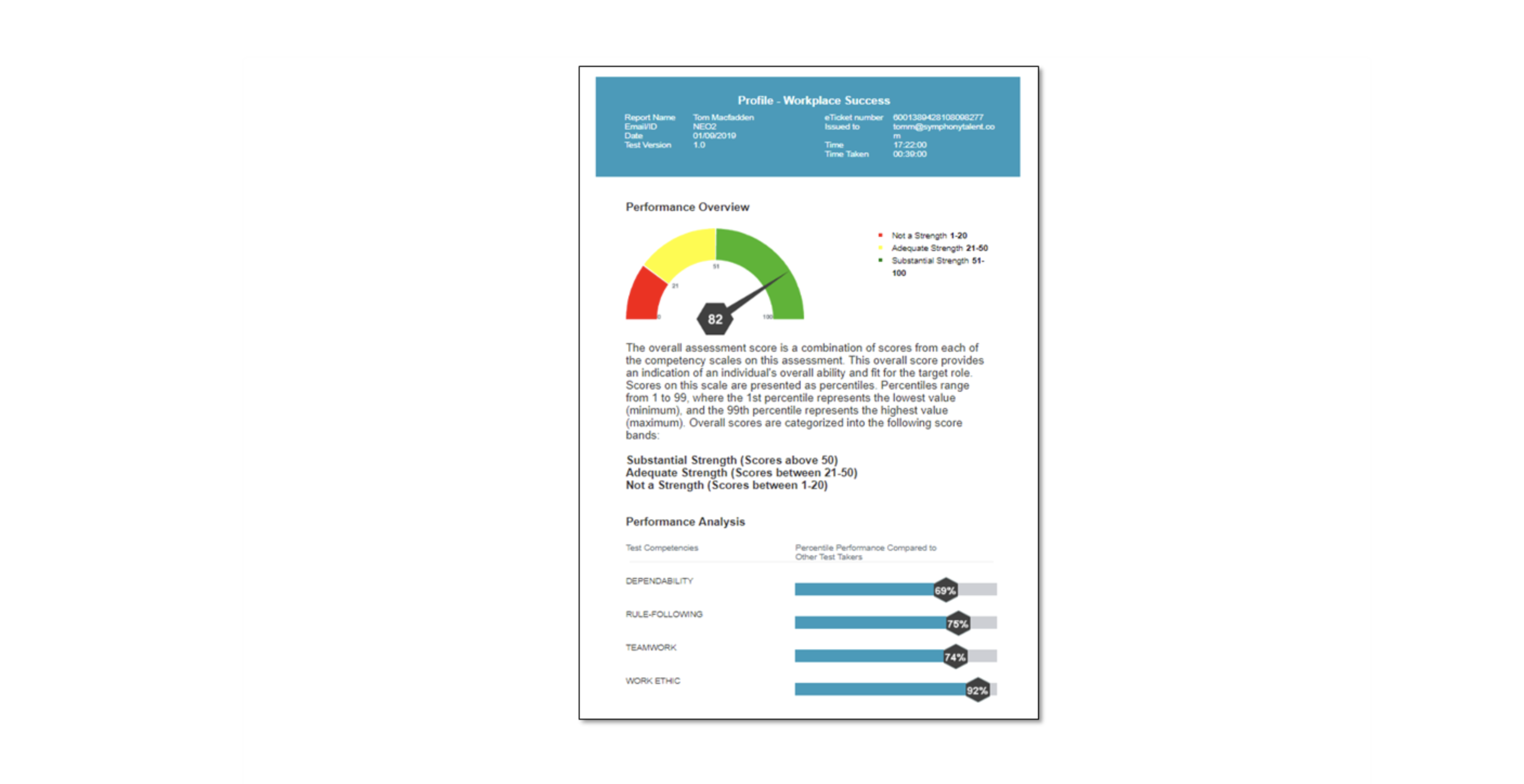
Symphony Talent offers skill profiles in their scorecards, providing a view of how candidates perform across different skills. They also generate automated scorecards and send alerts, ensuring that the recruitment team stays updated.
Their reporting capabilities include a comprehensive overview, allowing recruiters to compare multiple candidates at once. This feature can be particularly useful when shortlisting candidates for further interview rounds.
However, Symphony Talent lacks features like PDF reports, public reports, and Excel/CSV exports. Additionally, there is no benchmarking or detailed skill-wise analysis, which might limit the depth of evaluation for some recruiters.
Comparison of scorecards, reporting and analytics
Adaface vs Symphony Talent: Assessment quality control
Quality control in assessments ensures the validity and reliability of the results recruiters depend on. It's about rigorous checks, continuous improvement, and feedback loops to refine the testing process.
Adaface's quality control features
Adaface prioritizes quality control with multiple layers of scrutiny before a question goes live. This ensures every question is meaningful and relevant.
We actively replace questions based on usage limits to prevent overexposure and maintain test integrity. Our social listening tools help us stay ahead of potential leaks.
Incorporating customer and candidate feedback is key to refining our tests. Plus, our proprietary algorithms continuously enhance question quality and overall assessment accuracy. For a deeper dive, check out the science behind Adaface tests.
Symphony Talent's quality control features
Symphony Talent has implemented a quality control process that involves various checks before assessments are published. The specifics of their review process, however, remain somewhat opaque, leaving potential users with questions about the depth of these checks.
While Symphony Talent claims to have measures in place for maintaining quality, details on how they gather feedback from both candidates and customers are sparse. This lack of transparency can raise concerns about the adaptability and relevance of their assessments over time.
Furthermore, without a clear strategy for replacing overused questions or leveraging algorithms to enhance question quality, Symphony Talent may be missing out on opportunities to ensure their content remains fresh and effective for evaluating candidates. For more insights, you can explore our blog on recruitment challenges.
Comparison of quality control
Adaface vs Symphony Talent: Customer support
Customer support in assessment platforms can make or break a recruiter's experience. It ensures that any issues or questions are promptly addressed, allowing recruiters to focus on hiring the best talent.
Adaface's customer support features
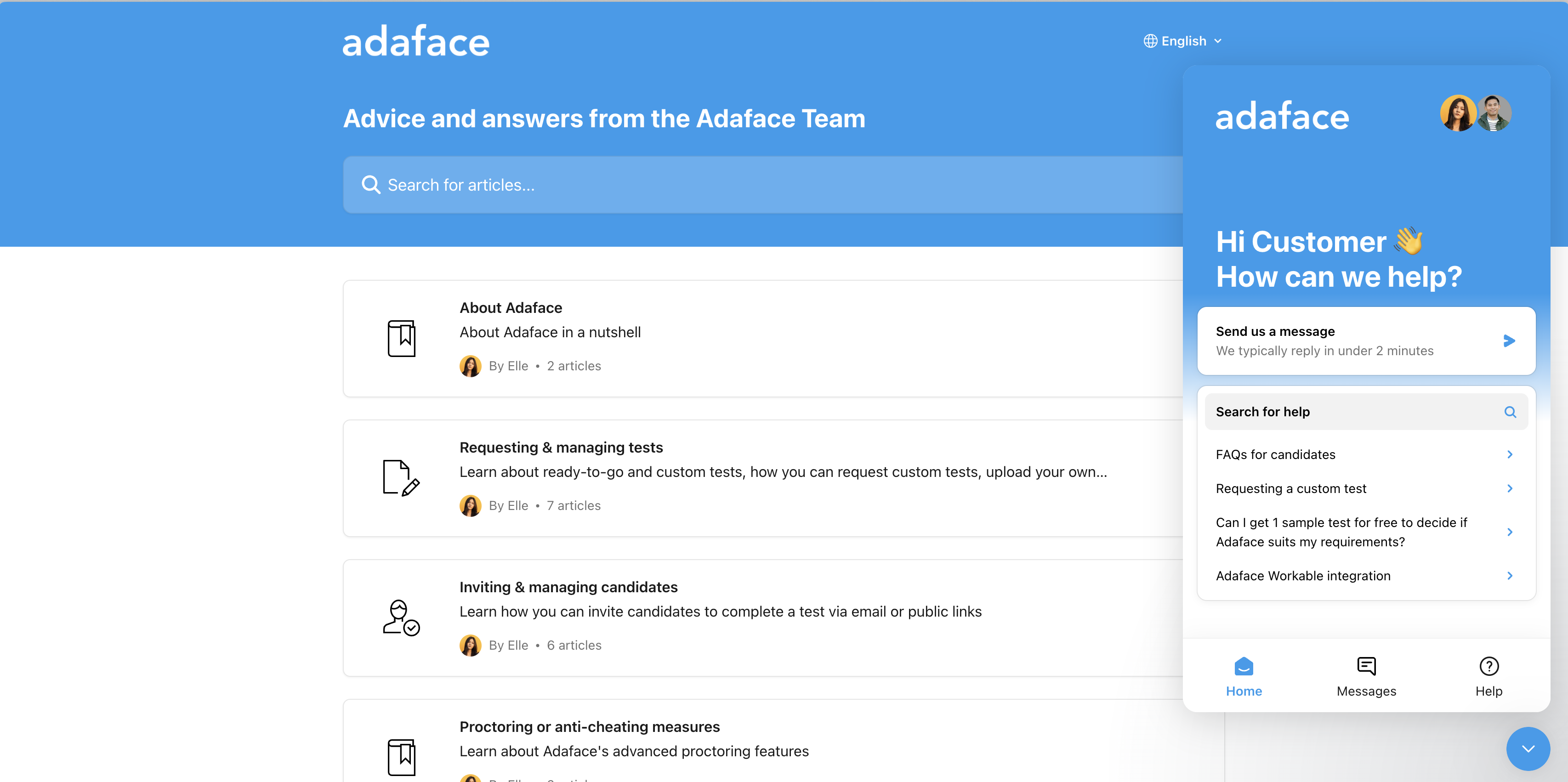
Adaface offers multiple channels for customer support, including email and live chat. This ensures that recruiters can get assistance whenever needed.
Our platform also features a detailed help center with articles, guides, and FAQs. This resource helps users find quick solutions and understand how to use various features effectively.
Additionally, Adaface provides training and onboarding for new users. This helps recruiters familiarize themselves with the platform and make the most of its capabilities from the get-go.
Symphony Talent's customer support features
Symphony Talent offers email support and a help center filled with articles to assist users with common questions. However, they lack live chat, which can make immediate problem-solving a bit of a scavenger hunt for recruiters.
While email support is a step in the right direction, the absence of dedicated priority support and training resources might leave some users feeling a bit adrift when trying to navigate the platform effectively.
Comparison of customer support
Adaface vs Symphony Talent: Final verdict
Both Adaface and Symphony Talent offer aptitude, business, typing, and personality tests. They also let you add custom questions for a tailored assessment.
Despite these similarities, Adaface shines brighter due to its conversational interface and mobile-friendly assessments, which improve the candidate experience.
Symphony Talent lacks support for programming, situational judgment, and AI tests. It also doesn't offer language and finance tests, which are key for many recruiters.
Streamline hiring with skill tests
On the other hand, Adaface covers a wider range of assessments, including programming, AI, and cloud tests. It even supports multiple languages and customizes tests per job description.
Pre-employment assessments help recruiters evaluate culture fit, personality, cognitive ability, and job-specific skills. They simplify the process of finding the right talent.
Using these tools, recruiters save time and make better hiring decisions by focusing on candidates' actual skills instead of just resumes.
Adaface stands out as the solution with its comprehensive features and friendly candidate experience. To learn more, check out our pre-employment assessment tools or explore our platform features.
Adaface vs Symphony Talent FAQs
Adaface offers programming, aptitude, business, language, AI, and cloud tests, among others.
No, Symphony Talent does not offer programming or coding tests.
Adaface uses a credit-based system, while Symphony Talent's pricing scales with company size.
Adaface provides more anti-cheating features, including webcam proctoring and plagiarism detection.

40 min skill tests.
No trick questions.
Accurate shortlisting.
We make it easy for you to find the best candidates in your pipeline with a 40 min skills test.
Try for freeRelated posts



